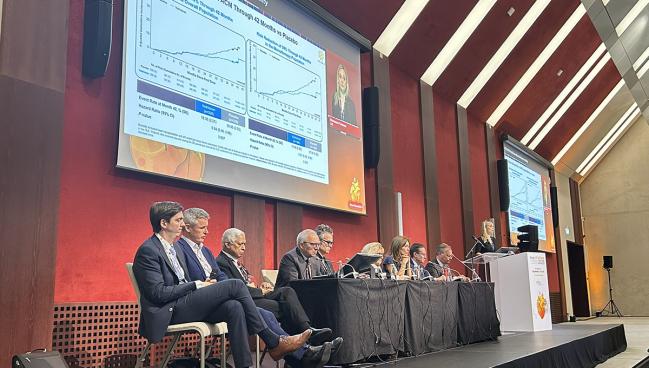HELIOS-B: Additional Data Affirm Benefits of Vutrisiran for ATTR-CM
While the results bolster efficacy, questions remain about high costs and other issues with the ATTR-CM therapies.

BELGRADE, Serbia—A more complete dataset from HELIOS-B confirms the main results of the trial and fills in the picture regarding the impact of vutrisiran (Amvuttra; Alnylam) on cardiovascular outcomes in patients with transthyretin amyloidosis cardiomyopathy (ATTR-CM).
The small interfering RNA therapy reduced both all-cause and CV mortality, with post hoc analyses indicating declines in CV and heart failure (HF) hospitalizations and urgent HF visits relative to placebo through, Marianna Fontana, MD, PhD (University College London, Royal Free Hospital, London, England), reported here at the European Society of Cardiology’s Heart Failure 2025 congress.
The findings were directionally similar irrespective of the baseline use of the transthyretin stabilizer tafamidis (Vyndaqel and Vyndamax; Pfizer), although the relationships were not significant among the 40% of patients who were taking that medication.
Published simultaneously online in the Journal of the American College of Cardiology, “these results demonstrate the robust and consistent effect of vutrisiran across a spectrum of CV and heart failure outcomes, with a large impact on urgent heart failure visits,” Fontana said during her presentation. “These data reinforce the positive results from the HELIOS-B primary analysis and further demonstrate the beneficial effect of vutrisiran on mortality rates and CV health for patients with ATTR cardiomyopathy.”
As reported previously, in HELIOS-B vutrisiran—which works by reducing hepatic synthesis of transthyretin protein, thereby decreasing deposition of amyloid fibrils in the heart—lowered the risk of a composite of all-cause death or recurrent cardiovascular events in patients with ATTR-CM, with or without background tafamidis, the first drug approved by the US Food and Drug Administration for this condition. The trial’s results supported vutrisiran’s approval by the FDA earlier this year. The transthyretin stabilizer acoramidis (Attruby; BridgeBio) also has been approved for the treatment of ATTR-CM.
More Robust HELIOS-B Data
HELIOS-B investigators randomized 655 patients with ATTR-CM and a clinical history of HF to subcutaneous vutrisiran 25 mg or placebo once every 3 months, with the double-blind period lasting 33 to 36 months. Those who completed that phase were invited into an open-label extension study in which treatment could be continued for up to 2 years.
In the main trial analysis, outcomes were assessed through the double-blind period and up to 6 months of the open-label extension study, with follow-up lasting 39 to 42 months. This new analysis covers a similar span, but with 96.3% of patients having data through 42 months (compared with 42.4% for the main trial analysis). Patients who were randomized to placebo and then switched to open-label vutrisiran were considered placebo-treated patients for the current analysis because a mortality benefit would not be expected to be evident after only just 6 months of vutrisiran treatment, Fontana said.
Consistent with the main trial results, in this more robust dataset vutrisiran reduced the risk of all-cause death (HR 0.64; 95% CI 0.46-0.88) and CV mortality (HR 0.67; 95% CI 0.47-0.96) compared with placebo. In addition, during the double-blind phase, the drug lowered the rate of recurrent CV events (rate ratio [RR] 0.73; 95% CI 0.61-0.88) and the risk of a composite of CV mortality and CV events (HR 0.72; 95% CI 0.55-0.94).
Digging into the cardiovascular events, the investigators found that vutrisiran was associated with less CV hospitalization (RR 0.75; 95% CI 0.62-0.91), urgent HF visits (RR 0.54; 95% CI 0.30-0.98), and HF hospitalizations (RR 0.67; 95% CI 0.52-0.86).
Treatment did not affect the risk of arrhythmia hospitalization, regardless of baseline tafamidis use.
Mulling Cost and Other Questions
Johann Bauersachs, MD (Hannover Medical School, Germany), the discussant for the study, said the findings confirm the main HELIOS-B results and provide more details about vutrisiran’s effects on mortality and CV health. The reductions in HF hospitalizations and urgent HF visits in particular are “very important for our patients, and we clearly want to see this because these patients are often hospitalized, said Bauersachs.
Based on the types of patients included in HELIOS-B, the data mainly apply to older white men and those with earlier-stage heart failure, he indicated. “Early diagnosis and treatment of amyloidosis is mandatory, and vutrisiran may become a standard for newly diagnosed patients and those progressing on stabilizing therapies.”
Still to be worked out are how the various treatments for ATTR-CM might be used together and in what sequence, which patients should not be treated, and cost-effectiveness, Bauersachs noted. Indeed, all these agents are expensive, with Alnylam giving vutrisiran an annual list price of $477,000 at the time of FDA approval.
In a JACC editorial, Amrut Ambardekar, MD (University of Colorado Anschutz Medical Campus, Aurora), and Sarah Cuddy, MD (Brigham and Women’s Hospital, Boston, MA), also eye cost when stating that the indication of benefit in the subgroup of patients treated with both tafamidis and vutrisiran “should not be interpreted as supporting combination therapy at this time. The data presented are hypothesis-generating but insufficient to direct practice change.”
They agree with the researchers that larger, prospective studies are required to answer this question. “Given the exceedingly high cost of current therapies, such studies would ideally also include rigorous health economic evaluations to assess cost-effectiveness from both patient and societal perspectives,” they write. “Looking forward, future studies to evaluate head-to-head comparisons of stabilizers versus silencers and to identify patient subgroups who may benefit more from one mechanism of action over another would likely be prohibitively costly.”
The ongoing CARDIO-TTRansform trial of another therapy for ATTR-CM, eplontersen (Ionis Pharmaceuticals), has randomized more than double the number of patients enrolled in HELIOS-B, Ambardekar and Cuddy note, “and will hopefully shed further light on the question of combination therapy.”
For now, these updated analyses from HELIOS-B “have provided compelling evidence that vutrisiran is an effective treatment for a broad range of ATTR-CM patients, with consistent benefits across multiple meaningful outcomes,” they write.
But the availability of three approved therapies for ATTR-CM raises questions around which should be considered first-line therapy, what to do once the disease progresses, and how to manage the costs of treatment, the editorialists highlight. “The next evolution in ATTR-CM treatment is on the horizon, and despite the dilemmas, it is fortunate that we have options.”
Todd Neale is the Associate News Editor for TCTMD and a Senior Medical Journalist. He got his start in journalism at …
Read Full BioSources
Witteles RM, Garcia-Pavia P, Damy T, et al. Vutrisiran improves survival and reduces cardiovascular events in ATTR amyloid cardiomyopathy: HELIOS-B. JACC. 2025;Epub ahead of print.
Ambardekar AV, Cuddy SAM. Transthyretin gene silencing in amyloid transthyretin cardiomyopathy: a novel treatment delivers new dilemmas. JACC. 2025;Epub ahead of print.
Disclosures
- This study was funded by Alnylam Pharmaceuticals.
- Fontana reports having received consulting or advisory board fees from Alexion/Caelum Biosciences, Alnylam Pharmaceuticals, AstraZeneca, Attralus, Bayer, BridgeBio/Eidos, Cardior, Intellia, Ionis Pharmaceuticals, Janssen, Lexeo Therapeutics, Mycardium, Novo Nordisk, Pfizer, and Prothena; having received research grants from Alnylam Pharmaceuticals, AstraZeneca, BridgeBio, and Pfizer; having received salary from the British Heart Foundation Intermediate Fellowship; and having share options in Lexeo Therapeutics and Mycardium.
- Cuddy reports having received grant support from the National Institutes of Health and the American Heart Association and personal speaking/consulting fees from Pfizer, BridgeBio, Ionis, AstraZeneca, Alexion, Novo Nordisk, Life Molecular Imaging, and Attralus.
- Ambardekar reports no relevant conflicts of interest.





Comments